PALM BEACH, United States (REUTERS) - US President-elect Donald Trump said on Saturday (Nov 26) that his administration would "do all it can" once it takes office on Jan 20 to help increase freedom and prosperity for Cuban people after the death of Fidel Castro.
Trump had threatened late in his White House campaign to reverse President Barack Obama's moves to open relations with the Cold War adversary after more than a half-century's estrangement due to his concerns about religious and political freedom in Cuba.
But in his first statement on Cuba policy since the Nov 8 election, issued from his West Palm Beach, Florida, resort where he and his family are spending the weekend after Thanksgiving, Trump did not say whether he would roll back Obama's measures.
"Though the tragedies, deaths and pain caused by Fidel Castro cannot be erased, our administration will do all it can to ensure the Cuban people can finally begin their journey toward prosperity and liberty," Trump said in the statement.
"While Cuba remains a totalitarian island, it is my hope that today marks a move away from the horrors endured for too long, and toward a future in which the wonderful Cuban people finally live in the freedom they so richly deserve," he said.
Trump's statement marked a softening from his late campaign rhetoric on Cuba policy.
"This may be one place where his business interests prod him to take a more pragmatic course, even if that angers the hard core anti-Castro elements of both parties," one US intelligence official told Reuters, speaking on the condition of anonymity.
Trump has just begun to fill out the top ranks of his national security team, and has not yet named his top diplomat - the Secretary of State - who will play a major role in formulating policy on Cuba.
A second US official noted the advisers Trump has named thus far are not known to have any particular interest in Cuba. That may mean Trump's economic team will have more sway over Cuba policy, which could lead to a more pragmatic approach than Trump's campaign pledges, the second official said.
WHAT WILL TRUMP DO?
Trump - a real estate magnate and reality TV star with an unconventional approach to politics - had started his campaign saying he was open to lifting the long-standing embargo on trade with Cuba.
In January, he said on Fox News that he was in favour of "opening it up" with Cuba, but wanted a better "deal" than Obama had made, comments he repeated in a debate with Republican rivals in March.
"I would want to make a strong, solid, good deal because right now, everything is in Cuba's favour," Trump said in March, saying he would "probably have the embassy closed" in Havana until a new deal was made.
When Obama visited Cuba later that month, Trump said in an interview with CNN that he "probably" would continue to normalise economic and diplomatic relations with Cuba, and would even open a Trump hotel in Cuba if the conditions were right.
"I think Cuba has certain potential, and I think it's okay to bring Cuba into the fold, but you have to make a much better deal," he said, noting he was worried Cuba would sue the United States for reparations for damage caused by its decades-long embargo on Cuba.
Cuba policy was not part of a major foreign policy address Trump delivered in April. After he secured his party's nod, his position shifted to a more traditional Republican position.
At a Miami rally in September, Trump said he would roll back Obama's Cuban policy reforms unless Cuban leaders allowed religious freedom and freed political prisoners. "The next president can reverse them, and that I will do unless the Castro regime meets our demands," Trump told supporters.
His vice-presidential running mate Mike Pence also took a hard line. "Let me make you a promise," Pence said in Miami just days before the election. "When Donald Trump is president of the United States, we will repeal Obama's executive orders on Cuba."
On Saturday, Pence tweeted: "The tyrant Castro is dead. New hope dawns. We will stand with the oppressed Cuban people for a free and democratic Cuba. Viva Cuba Libre!"
PRESSURE FROM REPUBLICANS
Trump will face pressure to reverse Obama's orders on Cuba from a bloc of mostly Republican Cuban-American lawmakers that has worked to keep tight restrictions on trade and travel with Cuba for years.
They believe Cuba's government is still too repressive to ease economic and travel restrictions.
Florida Senator Marco Rubio, who ran against Trump to be the Republican presidential candidate, said Castro turned Cuba into "an impoverished island prison" where dissidents were routinely jailed and killed.
"The dictator has died, but the dictatorship has not," Rubio said in a statement. "The future of Cuba ultimately remains in the hands of the Cuban people, and now more than ever Congress and the new administration must stand with them against their brutal rulers and support their struggle for freedom and basic human rights."
Ileana Ros-Lehtinen, a senior Republican House lawmaker from Florida who fled Cuba as a child, said on CNN that Castro's death changed nothing. "We lost our native homeland to communism," Ros-Lehtinen said. "They just rule over Cuba with an iron fist."
Senator Tom Cotton, a military veteran from Arkansas who some have touted for a Trump Cabinet role, said Castro "created hell on earth for the Cuban people. He will now become intimately familiar with what he wrought."
Republican Senate Majority Leader Mitch McConnell said he hoped Raul Castro, Fidel's younger brother and Cuba's president, would "turn the page" on oppression. "Freedom and democracy are long overdue in Cuba," he said in a statement.

